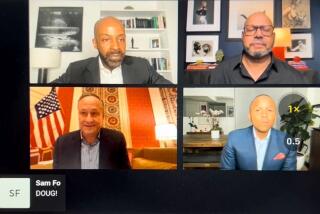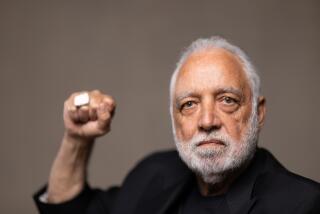Andelson Dies of AIDS; Gay Regent, Activist
University of California Regent Sheldon Andelson, a Democratic Party heavyweight once regarded as the nationâs most influential gay political figure, died Tuesday night of complications from AIDS at the Bel-Air mansion where he entertained senators and presidential hopefuls.
The first openly gay person appointed to the Board of Regents, or any other high position in state government, Andelson had been ill with the effects of acquired immune deficiency syndrome for more than a year. He was 56 and died quietly with family members at his side, a family spokesman said.
For the record:
12:00 a.m. Dec. 31, 1987 For the Record
Los Angeles Times Thursday December 31, 1987 Home Edition Part 1 Page 2 Column 5 Metro Desk 2 inches; 56 words Type of Material: Correction
An article Wednesday on the death of Sheldon Andelson, a member of the University of California Board of Regents, omitted the name of one of the organizations where contributions may be sent in lieu of flowers. The family asks for donations to be made to the Gay and Lesbian Community Services Center in Hollywood, where Andelson was director emeritus, or to the American Foundation for AIDS Research.
âThe story of Shelly Andelson is the story of America at its best,â U.S. Sen. Edward M. Kennedy (D-Mass.) said in a 1984 speech presenting Andelson with a major honor from the American Jewish Committee.
Born in Boyle Heights when it was a Jewish enclave of Los Angeles, Andelson went on to accumulate wealth. He was a lawyer, art patron and the founder and chairman of the Bank of Los Angeles, which is based in West Hollywood.
But he was best known for his political activity--especially for the huge amounts of money he raised for liberal politicians at lavish parties and private dinners in his hillside Bel-Air home and West Hollywood restaurant.
The villa-style house on Stradella Drive was built with entertaining in mind. One room was devoted to a bar with space to accommodate a half-dozen bartenders.
Famous Visitors
Visitors included Kennedy, former Vice President Walter Mondale, former Sen. Gary Hart (D-Colo.), Sen. Alan Cranston (D-Calif.) and Los Angeles Mayor Tom Bradley.
Former Gov. Edmund G. Brown Jr. was a special favorite, and it was Brown who unleashed a storm of controversy by appointing Andelson to the Board of Regents in 1981.
In gay circles, the image of the nationâs top Democrats sitting down to dinner unashamed with Andelson lifted him to the status of treasured role model.
âI donât know any other gay person who was moving in those circles,â recalled a friend, Los Angeles Superior Court Judge Rand Schrader.
A USC-trained lawyer and fraternity man, Andelson was reluctantly drawn into admitting to the world that he was a homosexual. At the start of his career, Andelson dared not dream that he could even become respectable, let alone come to know most of the countryâs top Democrats as friends and receive a seat on the prestigious Board of Regents.
Target of Prejudice
While attending Manual Arts High School, Andelson said he felt the sting of prejudice for being a Jew. Then he went to Stanford, where he graduated, and discovered that his homosexuality admitted him to a more castigated minority.
After law school, he often defended gay men arrested by Los Angeles police vice squads of the 1950s and â60s. But he was slow to join personally in gay liberation movements during the Vietnam War era, and he denied his secret to friends and family until much later.
In 1983, Andelson spoke at length to The Times about life as a gay educated professional man in Los Angeles in the days before many gays began to leave the closet.
Andelson recalled that insurance companies and landlords blacklisted single men, any hint of scandal could finish you professionally, and you lived in fear that police would raid genteel cocktail parties where the most scandalous behavior was heated discussions of Adlai Stevenson and Fidel Castro.
Just going to dinner at a nice restaurant required finding a woman friend to act as a âdate,â Andelson added.
Leading a Double Life
âThe loneliness . . . God, I got depressed. . . . You lived a double life. We assumed we were excluded from the Red Cross, United Way, the Democratic and Republican Party. We knew where we werenât wanted and we didnât go there,â Andelson said.
Andelsonâs wealth came from legal work and a real estate empire he started by acquiring lots in what was then, two decades ago, the depressed county territory of West Hollywood.
As his financial portfolio grew, friends appealed to Andelson to support the fledgling gay causes that began to spring up around town. He contributed anonymously at first, but gradually began to donate larger amounts that attracted public attention. Eventually, he became one of the gay communityâs most dependable sources of money for political and social causes.
But it was a quiet activism. He recalled blushing when a judge called him to the bench in 1971 and asked Andelson why his name was on the letterhead of a new social service agency for gays.
âI went out of the courtroom in a sort of daze. I thought, âWhat do I do now? The word is out!â â Andelson said.
Honored at Dinner
His personal landmark came in 1979, when he revealed his sexual orientation to his father. The Gay and Lesbian Community Services Center, a large social agency in Hollywood, honored him with a dinner, a flashy affair attended by Brown and Lillian Carter, mother of President Jimmy Carter.
From then on his public image was Sheldon Andelson, gay activist. But his interests were varied. He ran the Bank of Los Angeles until stepping down as chairman earlier this year because of the illness (he remained chairman of BKLA Bancorp, the holding company). He was a high-profile partner of Trumps, a trendy Melrose Avenue restaurant in West Hollywood, where Andelson once held a reception for the Rev. Jesse Jackson.
Andelson also was a member of the Anti-Defamation League of Bânai Bârith, a founder of the Museum of Contemporary Art in downtown Los Angeles, and a director of the ACLU Foundation. He served on a committee of the 1984 Olympic Games in Los Angeles.
Friends said Andelson seemed most tickled by his seemingly instant admission to the upper levels of American politics. He liked to recall, one friend said, the time he dined at the home of Sen. Claiborne Pell (D-R.I.) with five other U.S. senators while in Washington for the 1985 Reagan inauguration.
âMy Golden Momentâ
âI didnât start at the grass roots--I came in at the top,â Andelson said in 1984, in a frank assessment of his beginnings as a political heavy-hitter. âWith a little style and a little pizazz, I became very successful at fund-raising. I raised more money for Jerry Brownâs Senate race--that was really my golden moment--than anyone in the state.â
Brown had taken a big risk by appointing Andelson to the Board of Regents, traditionally one of the most prestigious posts that a governor of California has the power to fill.
A nasty confirmation battle ensued, with state Sen. H.L. Richardson (R-Glendora) denouncing Andelson on the floor of the Senate as âa guy in the education world who has been pushing sick ideas and sick influences on the community.â
Andelson eventually won confirmation with no votes to spare, but only after transfering his ownership of a popular gay bathhouse on West 3rd Street in Los Angeles to a business partner.
Friends said later that the bathhouse, while highly profitable, proved to be a major embarrassment, especially as research suggested that the AIDS virus was being spread by promiscuous sexual relations then common at gay baths. The bathhouse finally closed as AIDS scared off clientele.
Only One Contribution
Andelson withdrew more and more the past year, friends said. He made only a small contribution to the campaign that defeated the Lyndon LaRouche AIDS initiative in 1986, although the campaign became a cause celebre in the gay community.
The family announced that a memorial service will be held Jan. 10 at 11 a.m. at Royce Hall on the UCLA campus.
A private interment will be held for family members. In lieu of flowers, the family asked that donations go to the American Foundation for AIDS Research, where Andelson was a co-chair.
Andelson is survived by his father, Al Horwitz of Chicago, two brothers, Sherman and Arlen, who live in Los Angeles, a sister, Jaimee Levin, in Illinois, and six nieces and nephews.
More to Read
Sign up for Essential California
The most important California stories and recommendations in your inbox every morning.
You may occasionally receive promotional content from the Los Angeles Times.










